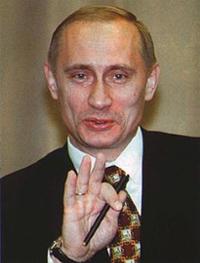President Vladimir Putin looking ahead to G-8 summit, says education key to combatting extremism
President Vladimir Putin said boosting education, one of three priority areas for the Group of Eight under Russia 's chairmanship this year, is key to combatting extremism.

"It is very easy for the missionaries of various extremist organizations and preachers of the most extremist stripe to work with illiterate people," Putin said in an interview with Rossiya state television broadcast Wednesday.
"This is a nutrient medium for xenophobia, for the inflammation of interethnic and inter-religious enmity. It is, in the final analysis, fertile ground for terrorism," he said.
The other main topics of this year's G-8 summit in St. Petersburg in July are energy security and infectious diseases. Putin called for the battle against infectious diseases, including AIDS and bird flu, to go far beyond the G-8, saying that efforts to combat the spread of disease would not be effective if they are "not as global as the threat itself."
Putin stressed that the G-8 should treat the issue of energy security proceeding not only from the needs of the world's most industrialized countries, but also those of the entire world community. He said Russia 's contribution in this field would be "appreciable and substantial."
"And I think that no one has any doubt that today's Russia is capable of making its contribution to the solution of this global problem, this global task," he said.
Moscow has tried to present its role as the world's second-biggest oil exporter after Saudi Arabia and its location outside the volatile Middle East into an image of the guarantor of energy security. Yet after its New Year's spat with Ukraine over gas prices and its shut-off of supplies to the former Soviet republic a move many saw as motivated by Moscow 's alleged desire for revenge after Kiev 's westward tilt that image has been irrevocably dented.
"Before the crisis in Ukraine , between Russia and Ukraine , dependence (on gas) was regarded as the beginning of partnership, maybe the beginning of the alliance. Now it is regarded as a threat," said Viktor Kremenyuk, deputy director of USA-Canada Institute.
The Group of Seven richest industrial countries reached out to Russia in 1991, inviting then-Soviet President Mikhail Gorbachev in a bid to encourage Moscow to keep its huge post-Soviet nuclear arsenal safe.
In 1992, President Boris Yeltsin was invited to take part in summit meetings as a gesture of support for his country's fledgling democracy.
Ten years later, Russia was brought into the exclusive club excepting participation in some economic discussions confirming Moscow's insistence that in spite of the disintegration of the Soviet Union, its economic slide and military decline, its influence in the world was undiminished.
Yet the Russia-Ukraine gas standoff which briefly cut off supplies going further West into Europe together with Moscow's crackdown on non-governmental organizations and other perceived setbacks to democracy in Russia have reinforced the conviction among some critics that Russia shouldn't even have a place at the G-8 table.
"It continues to be as it was 10 years ago when Russia was invited to join the group: non-ally and the poorest, with a rather stagnant economy," Kremenyuk said. "So from this point of view, it's understandable that some people say: "'Why should Russia be there?"”, reports the AP.
D.M.
Subscribe to Pravda.Ru Telegram channel, Facebook, RSS!





